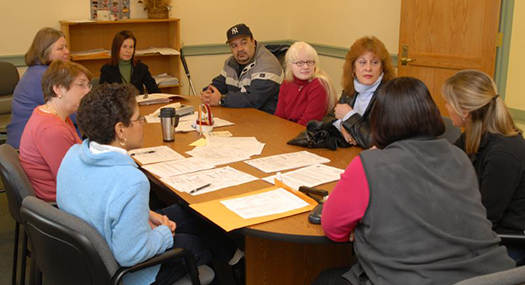
Who Should Attend an IEP Meeting?

IEP Attendees – Who Must Attend, and Who is Permitted?
As we approach end-of-school-year IEP season, I always receive questions regarding who should attend IEP meetings. This year, especially, I have heard from an increased number of parents asking whether the proposed list of IEP attendees is appropriate. Below is a guide with information regarding which IEP team members are mandatory, and which team members are permitted to attend, but are not necessarily required to participate.
Mandatory IEP Participants:
- At least 1 general education teacher, if the student is or may participate in the general education setting;
- At least 1 special education teacher/provider;
- A representative of the public agency (school district/LEA) who is qualified to provide, or supervise the provision of, specially designed instruction to meet the unique needs of children with disabilities; is knowledgeable about the general education curriculum; and is knowledgeable about the availability of resources of the public agency;
- At least one person who is able to interpret the results of any evaluations being reviewed (when appropriate/necessary);
- The Parents (or education rights holder); and
- The Student, if the Student has turned 18 and holds his/her educational rights.
Permissible IEP Participants:
- Additional teachers and service providers, if available and permitted by the LEA;
- Any other individuals who have special knowledge regarding the student, including service professionals;
- The student may attend, when appropriate; and
- An attorney and/or advocate.
When is Attendance Not Necessary:
A mandatory team member is not required to attend the IEP meeting if the Parent and Public Agency consent, and that member’s area of service is not being modified or discussed at the IEP meeting.
Excusing Members:
A mandatory team member may be excused, even when the meeting involves discussing the member’s area of curriculum and services, if the Parents and Public Agency both consent, and the member submits prior written input regarding the development of the IEP.
Should You Give Notice of Additional Participants?
You do not need to give notice if you plan to bring additional participants to the IEP meeting, but doing so is generally advised. This will ensure that adequate seating is made available. Additionally, if you intend to bring an attorney to the IEP meeting, the Public Agency has a right to bring an attorney, as well. To avoid a meeting being cancelled due to a lack of notice, it is generally advised to notify the Public Agency if you intend to bring legal representation. The District is also not prohibited from having an attorney at IEP meetings when a Parent does not obtain counsel.
Key Take-Aways:
- The school team can choose which teacher(s) will be available for the IEP meeting. If you have a specific teacher that you feel should participate in the meeting, you should make this request in advance. There is no guarantee, but it is appropriate to ask, and explain why this provider’s input is most valuable. You can also request written updates from any teachers who cannot attend.
- The Public Agency representative is often the school principal, but will sometimes be a director of special education, or program specialist. If you aren’t sure, just ask.
- You hold the right to excuse mandatory team members for all or part of the meeting. The Public Agency needs to make all mandatory team members available for an IEP meeting within the statutory timelines.
Thank you Jazmine Gelfand for being our guest blogger for this week!

Jazmine Gelfand is a special education attorney who offers education and disability legal representation to the greater San Diego community. She is dedicated to zealously representing children with disabilities and their families, through a collaborative and results-oriented approach. Visit her website at www.specialedlegalcare.com or email her at Jazmine@SpecialEdLegalCare.com

